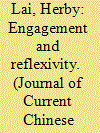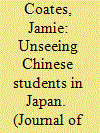| Srl | Item |
| 1 |
ID:
141522


|
|
|
|
|
| Summary/Abstract |
Amidst political tensions between China and Japan, and against the backdrop of the patriotic education campaign in China that promotes a negative image of Japan as the victimiser, Chinese students in Japanese educational institutions study and work in Japan in a highly politicised context. In general, how they chose to interpret their experiences in Japan, and their views on history and controversial political issues involving China and Japan, demonstrates two levels of cosmopolitanism – namely, the ability and the willingness to engage with Japanese people on such issues, and reflexivity towards their own national identities. Meanwhile, some informants would deliberately avoid talking about history and controversial political issues involving China and Japan. While they lacked the willingness to engage with Japanese people on controversial issues, their keenness to separate their daily lives in Japan from the political context means they were also engaged in a reflexive reconfiguration of their national identities.
|
|
|
|
|
|
|
|
|
|
|
|
|
|
|
|
| 2 |
ID:
141520


|
|
|
|
|
| Summary/Abstract |
Chinese migrants are currently the largest group of non-Japanese nationals living in Japan. This growth is largely the result of educational migration, positioning many Chinese in Japan as student-migrants. Based on 20 months’ ethnographic fieldwork in Ikebukuro, Tokyo’s unofficial Chinatown, this paper explores the ways in which the phenomenology of the city informs the desire for integration amongst young Chinese living in Japan. Discussions of migrant integration and representation often argue for greater recognition of marginalised groups. However, recognition can also intensify vulnerability for the marginalised. Chinese student-migrants’ relationship to Ikebukuro’s streets shows how young mobile Chinese in Tokyo come to learn to want to be “unseen.” Largely a response to the visual dynamics of the city, constituted by economic inequality, spectacle, and surveillance, the experiences of young Chinese students complicate the ways we understand migrants’ desires for recognition and integration.
|
|
|
|
|
|
|
|
|
|
|
|
|
|
|
|